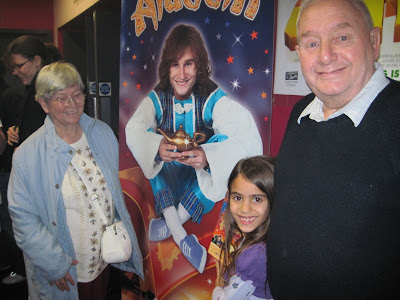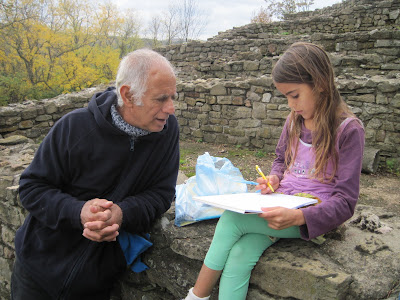















Having returned to Israel approximately 6 weeks ago and spending most of the time looking for a new place to live and settling back into work and school, the time has now come to take a good look at the lessons we have learnt from our time away and to incorporate them into our present and future lives.
One of the main things we focussed on during our 14 months away was homeschooling Lielle. It's quite amazing to think how I envisaged it before we left as opposed to how it turned out in reality. I imagined that we would follow a fairly rigid schedule of school-type lessons for approx 2 hours every morning, giving Lielle the opportunity to choose her subjects, but making sure that we included teaching her the necessary basic mathematical, reading, writing and comprehension skills through those subjects that she chose. In actual fact this is the way we taught her for approximately 3 months - and it was very successful. The advantages were:
(1) having a definite routine and spending a good part of the morning in a learning environment,
(2) it was time spent actively doing things together as a family (Dani joined Lielle in learning English, Lielle taught Dani computer skills, together we learnt about nature by working in the garden and helping our neighbours, etc.)
When we left Bulgaria for the UK where we stayed with family over the winter months, it became clear that it wouldn't be so easy to spend so many hours a day taking over the living space or kitchen as we had got used to. I also realised that for these very personalised lessons that we had been giving Lielle I had been putting in a good couple of hours of an evening in preparation, usually working on it after she was in bed. Now we were spending this time with family and it was clear that the homeschooling would take on a different format. At first I have to admit that I felt a little disappointed at the thought of having to abandon a system that seemed to be working so well, but after some consideration we came to the conclusion that we simply needed to be flexible in our approach and to use what resources were available to us without trying to go against the grain. Out of that understanding we ended up using the time to maximum benefit. We decided to use the local library facilities 3 mornings a week. This was time for working quietly through the few Hebrew workbooks that we had brought with us. Lielle was also able to use the computer there for an hour each time. And last, but of course not least, we were able to read - a lot! We took out around 6 books at each visit and Lielle's English really got kick-started. We took out many easy readers and both Dani and Lielle got hooked on Dr. Seuss. We also read longer chapter books and I was amazed at Lielle's level of comprehension. Through the books we learned about characters such as Anna Frank, and what war-time was like in England for the children who were evacuated (as was Lielle's grandad). We read classics such as "The Wind in the Willows" and Nannie and Grandad treated us to a trip to a special museum, based on the book, situated on the banks of the River Thames. We were also treated to a visit to a pantomime (a very British institution .... "oh no it isn't!" .... "oh yes it is!" - lol) - and of course we read the book first - Aladdin. In short, we simply took advantage of being surrounded by English resources to put the emphasis of those three months on learning English and it really paid off.
One of the things that we needed to create for Lielle was the opportunity for meeting up with other children her age. In Bulgaria this had not been too much of a problem since the village children were on school holiday and there were plenty of playmates. The only disadvantage there was that their level of communication was restricted by their lack of a common language. In the UK, where the language was no barrier, the problem was actually finding other children to interact with. To that end Lielle joined two groups, which in addition to providing interaction with others her age which was our primary motivation, also provided her with additional learning experiences: (1) Sunday school (cheder) at the local Jewish congregation, and (2) Heroes Flexischool - which she attended for six hours once a week. The centre offers a friendly, educational and flexible framework for homeschooling families. Lielle participated in hip-hop dance classes, sport, cookery, arts and crafts, drama, animal care and more and looked forward to it every week.
On returning to Bulgaria the homeschooling took on a more flexible approach. Lielle and I spent a lot of time together and most of the learning was done by being available to answer her questions and elaborate on them, and of course continuing with lots of reading. At the same time she seemed to show an aversion to learning maths, but then, like a guardian angel, our neighbour Elly stepped in. She enthusiastically took on the project of teaching Lielle maths several mornings a week and made it so much fun that it almost became one of Lielle's favourite subjects! It just goes to show how important it is that teachers enjoy what they teach and know how to pass that enthusiasm on.
As our time away was drawing to a close I became more and more aware of how Lielle's imminent return to school was a test not only of her abilities but of ours as her teachers. Had she learnt enough? Would she settle back in? We needn't have worried. Although initially a little slower than some of her classmates in reading and writing Hebrew she is catching up fast and is happy, well-adapted and doing well in her tests. She looks back fondly on the special year we spent away and the freedom and flexibility she enjoyed, but has settled in well and goes happily off to school each day. She has learnt so many life skills and has a wonderful appreciation for simplicity. We are so grateful that we created this opportunity.
In summary: The homeschooling experience was different to what we envisaged but nevertheless exceeded all our expectations. Second grade was the perfect timing for this adventure. Lielle already knew what school was like and so had something to compare it to. She had already mastered the basics of reading and writing and had she been in regular school for that year it would have been mainly one of bringing all the class members up to the same level and reinforcing what they had already learnt, thus for us as her educators it was easier material to work with. I have a great respect for people who decide to home educate their children; it is an awesome responsibility but the rewards are many. I am sure that the experience will remain with Lielle for ever and she will always remember that there are many different ways to achieve our goals, and we don't always have to opt for the conventional ones.
No comments:
Post a Comment